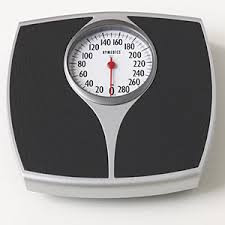And again. The more often people weigh thems elves, the more likely they are to eat less food. That’s the verdict from the Connell School of Nursing at Boston College, where researchers tracked the weight loss efforts of 148 people in a year-long study. HealthDay reports that the researchers divided the group into three: a “high/consistent” group that weighed themselves at least six days a week throughout the study period; a “moderate/declined” group that tended to slack off their self-weigh-ins (declining from four or five days a week to two days a week); and a “minimal/declined” group that decreased their self-weigh-ins from five or six days a week to no weigh-ins during the week.  At six and 12 months, HealthDay reports, the researchers assessed what they called the participants’ “confidence to avoid eating” in certain situations — such as when they felt down, when food was readily available, and when there was any social pressure to eat. Ready? The envelope please…By the end of the study, participants in the high/consistent self-weighing group had the largest increases in their confidence to avoid overeating, while dieters in the other two groups experienced no change.
elves, the more likely they are to eat less food. That’s the verdict from the Connell School of Nursing at Boston College, where researchers tracked the weight loss efforts of 148 people in a year-long study. HealthDay reports that the researchers divided the group into three: a “high/consistent” group that weighed themselves at least six days a week throughout the study period; a “moderate/declined” group that tended to slack off their self-weigh-ins (declining from four or five days a week to two days a week); and a “minimal/declined” group that decreased their self-weigh-ins from five or six days a week to no weigh-ins during the week.  At six and 12 months, HealthDay reports, the researchers assessed what they called the participants’ “confidence to avoid eating” in certain situations — such as when they felt down, when food was readily available, and when there was any social pressure to eat. Ready? The envelope please…By the end of the study, participants in the high/consistent self-weighing group had the largest increases in their confidence to avoid overeating, while dieters in the other two groups experienced no change.
